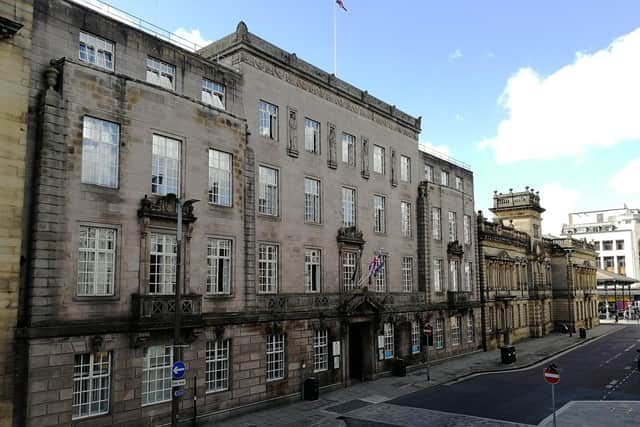Preston politician calls for nationalisations to ease cost of living crisis, as councillors demand government funds pay rise for local authority staff
and live on Freeview channel 276
Martyn Rawlinson was speaking at a meeting of the authority less than 24 hours before it emerged that the energy price cap is to shoot up again in October, pushing average yearly bills for gas and electricity to £3,549 – almost treble what they were 12 months earlier.
During debates on pay increases for local government staff and the effect of spiralling energy costs on councils themselves, there were calls from the ruling Labour group for radical – and immediate – government action to help households and town halls alike.


Advertisement
Hide AdAdvertisement
Hide AdCiting the French government’s decision last month to nationalise energy firm EDF, Cllr Rawlinson said similar moves were needed in the UK – but conceded that the current government “just don’t believe in it”.
“Everyone else can see that nationalising the railways, the energy [and] the water [companies]…there is no other way back. We’ve got to go back and nationalise these industries to bring the cost[s] down, so that we can absorb the cost and subsidise it, so that people can live – and then get them on a better footing and see where it goes from there.
“That’s the problem with lobbying government to do something – they will do what they want to do. They will just throw public money into private pockets again to try and sort this problem, which has been created by privatisation,” Cllr Rawlinson said.
He added that some public services were “on the edge” and warned that Preston’s own budget-setting process early next year would be “difficult”.


Advertisement
Hide AdAdvertisement
Hide AdCllr Rawlinson, who is also the cabinet member in charge of finances at the city council, acknowledged that the government had thrown “sometimes large amounts of money” at attempts to deal with the fallout from the pandemic, but said that they were usually just short-term fixes, rather than the kind of wholesale changes he said were needed.
He was backed in his nationalisation call by the recently re-elected former council leader Valerie Wise, who said that Preston residents, including some lower-paid council staff “will find that they have their power cut off…that they are plunged into debt with utilities…[and] that they can’t afford to eat or they can’t afford to heat their homes” – unless swift steps were taken to avert such an outcome.
Meanwhile, cabinet member for planning and regulation – and former South Ribble MP – David Borrow accused the government of doing “sod all” for the last two months about the looming hardship facing families this winter, while the Conservative Party has been choosing a new leader.
“And then we wonder why working people…who are struggling now, before the rises and big increases [happen]…are angry and worried now,” Cllr Borrow said.


Advertisement
Hide AdAdvertisement
Hide AdHe added that the next Prime Minister had the job of steering the country away from the rocks, but said he feared that it may, by then, be “too late”.
Conservative ward member Stephen Thompson – who represents Preston Rural North – said he believed that help was coming for people struggling with their energy bills, but stressed that nationalisation was not the answer.
“To say that the government is asleep at the wheel is probably not fair, because they are working on things in the background – but as you can appreciate, there is a leadership contest at the moment and, to be quite frank…I wish they’d made it a bit shorter.
“But we are where we are and I’m sure this government will recognise that there are people who will struggle this winter and there will be means put in place to try and help them.


Advertisement
Hide AdAdvertisement
Hide Ad“But as for nationalising industries, I think that goes a bit too far. There’s a lot of people whose pensions depend on the investments that big companies [make], so I think it would be a bit of a step backwards if we start nationalising things.
“Without a strong private sector economy we can’t have a public sector,” said Cllr Thompson, who added that he believed there should be stronger governance of large industries.
Liberal Democrat group leader John Potter told the meeting on Thursday that the October energy price cap rise would see Preston households paying an extra £113m on their gas and electricity bills – money that would not be available for them to spend in the local economy.
He said that a freeze in energy prices – proposed at national level by the Liberal Democrats and adopted by Labour – would save the average Preston household around £1,900.
Advertisement
Hide AdAdvertisement
Hide AdCouncillors were debating a notice of motion setting out support for a real terms pay rise for council workers and calling for national government to fully fund any negotiated settlement between the unions and the National Joint Council (NCJ) for local government services.
Around 1.5 million local government staff were last month offered a £1,925 pay increase for the year from April 2022. For the lowest paid staff – currently earning £18,333 per year – that equates to an increase of 10.5 percent.


All workers covered by the offer from National Employers – which negotiates pay on behalf of 350 local authorities – would get a minimum 4.04 percent increase. Teachers, chief officers and chief executives have separate national pay agreements.
However, Conservative opposition group leader Sue Whittam said that an inflation-equalling, double-digit wage increase for city council staff would leave Preston “bankrupt”.
Advertisement
Hide AdAdvertisement
Hide Ad“I totally agree that our staff have worked incredibly hard during the pandemic and they still continue to do so. Our staff are [our] most important asset.
“However, a real terms pay increase is not viable – you know the government is not going to fund this and it doesn’t matter what we say, they’re not going to do it. So we’re between a rock and a hard place here,” Cllr Whittam said.
Liberal Democrat Greyfriars ward member Fiona Dyke told the meeting that as a public sector worker herself, she was being offered a two percent pay increase this year, having been held to 0.1 percent for the last decade – equating to a real terms cut in her wage packet of 26 percent over that ten-year period.
She said that she faced being pushed into fuel poverty this winter.
Advertisement
Hide AdAdvertisement
Hide Ad“It’s not just people on the lowest incomes, there are those of us who are on reasonably comfortable incomes [who] are going to be absolutely hammered by this cost of living rise,” Cllr Duke warned.
Labour and Liberal Democrat city councillors supported the motion calling for a funded negotiated increase in council workers’ pay, while the opposition Tory group said it was unable to do so.
In proposing the motion, Brookfield ward member Naoimh McMahon said: “Through no fault of their own, residents of Preston – and especially those who are most financially stretched – will be turning to local government and, indeed, voluntary, community and faith organisations in Preston for help and support.
“So it’s unimaginable to me that at a time like this, government [would] consider that a real terms pay increase for local government workers be funded through further cuts to services or through raising of council taxes.”
Advertisement
Hide AdAdvertisement
Hide AdCllr Rawlinson said it was “quite right” that the pay offer had been “bottom-loaded” so that the lowest paid got the greatest proportional increase, but he added that senior staff also worked hard and were being paid less than they used to be in spite of their “huge responsibility”.
He added: “Keeping public sector pay down for so long…was always going to come back and bite you eventually – and now is that time So somebody’s got to bite the bullet [and] it’s got to be the government.
“Only the government can pay…this – we can’t pay it. If we do, we’ll be cutting yet more services and jobs. What will that do to the economy if we put people back on benefits?”
Neither the Treasury, nor the Department for Levelling Up, Housing and Communities responded to a request from the Post for comment on the issues raised at the council meeting.
Advertisement
Hide AdAdvertisement
Hide AdA government spokesperson told other media that the civil service was “making the appropriate preparations in order to ensure that any additional support or commitments on cost of living can be delivered as quickly as possible when the new prime minister is in place”.
Earlier this year, the then chancellor Rishi Sunak put in place £37bn worth of support to help households cope with previously announced energy price rises.
Soon-to-depart PM Boris Johnson said in a broadcast interview on Friday, after the latest price cap hike had been announced: "There's a pipeline of cash coming through over the next few months and through the autumn and the winter.
"But that is clearly now going to be augmented - increased - by extra cash that the government is plainly going to be announcing in September.
Advertisement
Hide AdAdvertisement
Hide Ad"We want to target the households, so most most of the money will go to the eight million most vulnerable households, that’s the right thing to do. A lot of money will be going to absolutely everybody.”
